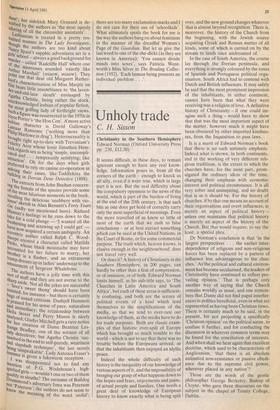Unholy trade
C. H. Sisson Christianity in the Southern Hemisphere Edward Norman (Oxford University Press pp. 230, £12.50) It seems difficult, in these days, to remain ignorant enough to have any real knowledge. Information pours in, from all the corners of the earth – enough to knock us all silly, even if it were true, which in large part it is not. But the real difficulty about the compulsory openness to the news of the world, which is part of the burden of living at the end of the 20th century, is that such bits as one does get hold of correctly carry only the most superficial of meanings. Even the more travelled of us know so little of most of the earth that we rush to false conclusions – or at best extract something ,which can be used at the United Nations, in the Court of Rome, or for some commercial purpose. The truth which, heaven knows, is elusive enough in the neighbourhood, does not travel very well. Or does it? A history of Christianity in the Southern Hemisphere, in 200 pages, can hardly be other than a feat of compression, or of omission, or of both. Edward Norman limits himself, as his sub-title says, to 'The Churches in Latin America and South Africa', but each of these areas is sufficiently confusing, and both are the scenes of political events of a kind which lend themselves to the simplifications of the media, so that we tend to over-rate our knowledge of them, as the media have to do for trade purposes. Both are classic examples of that historic over-spill of Europe which has brought so much trouble to the world – which is not to say that there was no trouble before the Europeans arrived, or that the inhabitants then enjoyed an idyllic peace. Indeed the whole difficulty of such history is the inequality of our knowledge of various aspects of it, and the impossibility of bringing our grasp of what happens down to the hopes and fears, enjoyments and pains, of actual people and families. One needs a great deal of knowledge of European history to know exactly what is being spilt over, and the new ground changes whatever that is almost beyond recognition. There is, moreover, the history of the Church from the beginning, with the Jewish source acquiring Greek and Roman matter of all kinds, some of which is carried on by the stream to lands once undreamed of.
In the case of South America, the course lay through the Iberian peninsula, and everything is strongly coloured by the tones of Spanish and Portuguese political organisation. South Africa had to contend with Dutch and British influences. It may safely be said that the most prominent impression of the inhabitants, in either continent, cannot have been that what they were receiving was a religion of love. A definitive history of Christianity – if one could imagine such a thing – would have to show that that was the most important aspect of the matter, however much it might have been obscured by other imported kindnesses, from the Inquisition to pass laws.
It is a merit of Edward Norman's book that there is no such untimely emphasis.
Indeed what is shown, in both continents, and in the working of very different religious traditions, is the extent to which the churches have, for the most part, prom ulgated the ordinary ideas of the time. changing their emphasis with economic interest and political circumstance. It is all very sober and uninspiring, and no doubt that is as it should be. For the history of churches, if by that one means an account of their organisations and overt influences, is merely an aspect of political history – unless one maintains that political history is merely an aspect of the history of the Church. But that would require, to say the least, a special plea.
Dr Norman's concluSion is that 'in the largest perspectives . . . the earlier interdependence of religious and non-religious forces has been replaced by a pattern of influence less advantageous to the churches.' As`the political and cultural environment has become secularised, the leaders of Christianity have continued to reflect prevailing opinion.' That is perhaps only another way of saying that the Church remains worldly as usual, and one remembers that Dante did not find papal interferences in politics beneficial, even in what are represented as having been Christian times. There is certainly much to be said, in the present, for not projecting a specifically *Christian opinion' on the political scene, to confuse it further, and for conducting the discussion in whatever common terms may be found for the conciliation of interests. And when shall we hear again that excellent doctrine, which used to be characteristic of Anglicanism, 'that there is an absolute unlimited non-resistance or passive obedience due to the supreme civil power, wherever placed in any nation'?
Those are the words of the gentle philosopher George Berkeley, Bishop of Cloyne, who gave three discourses on the subject in the chapel of Trinity College, Dublin,










































 Previous page
Previous page